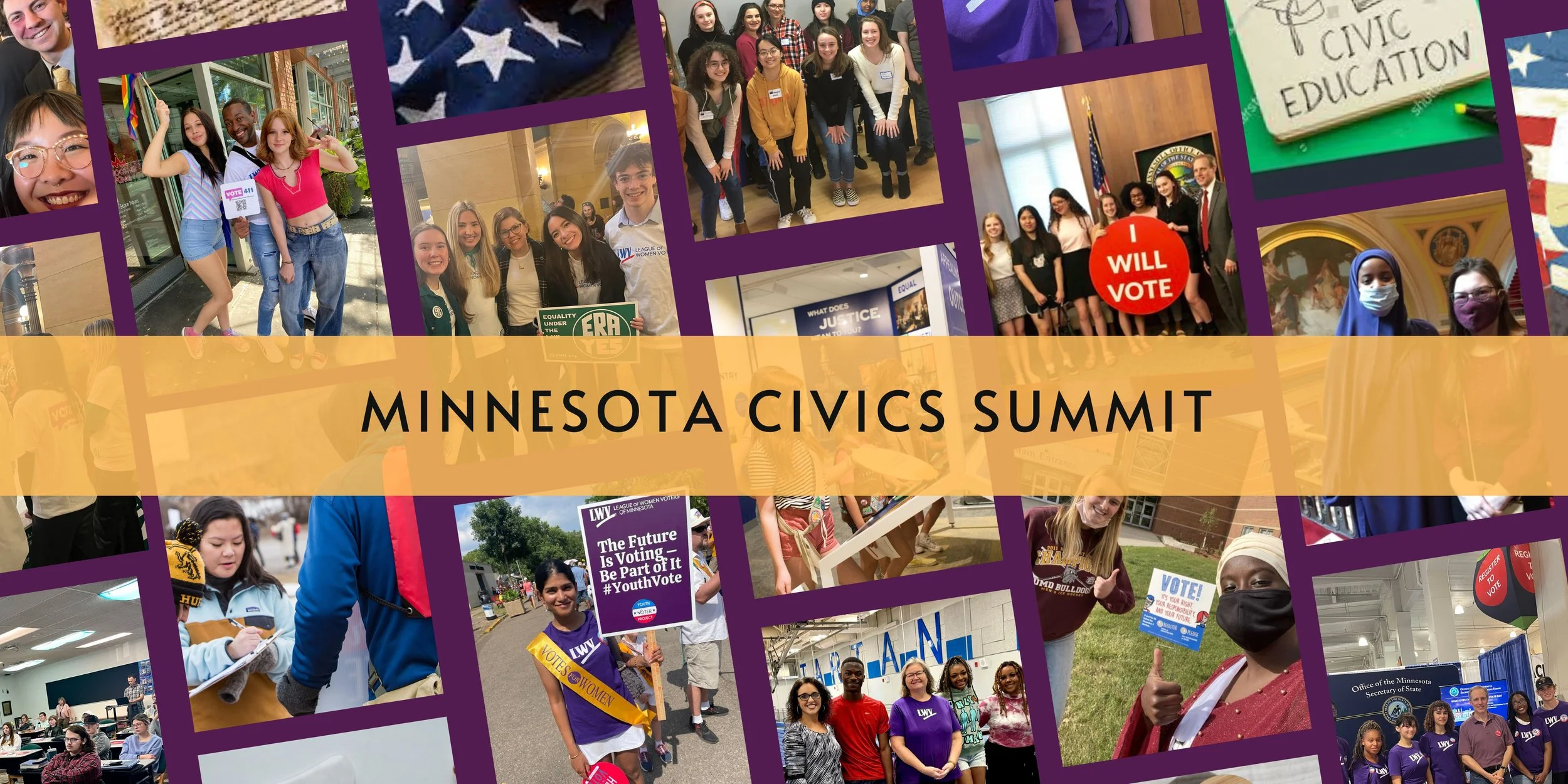“By its very definition, civic responsibility means taking a healthy role in the life of one’s community. That means that classroom lessons should be complemented by work outside the classroom. Service-learning does just that, tying community service to academic learning.” ~John Glenn, Astronaut & US Senator
OVERVIEW
Minnesota Civics Summit - A new, collaborative effort to jumpstart the new civics standards for 11th and 12th graders in Minnesota, to support teachers in their engagement of students in civics and voting. Organizing partners include the Minnesota Chapter - Federal Bar Association, LWV Minnesota, MN Council on the Social Studies, MN Department of Education, MN Humanities Council, MN Youth Council, TeachingCivics.org, YMCA Center for Youth Voice, and other interested teachers, community members and civics organizations. Join us!
COMMENTARY - “Civics that Sticks: What Minnesota has done and will do to prepare new generations of citizens.”
WHAT
Saturday, February 22, 2025, 9:00 am to 3:00 pm ~ a pre-conference opportunity in tandem with the Minnesota Council for the Social Studies annual meeting.
The Minnesota Civics Summit is designed to be a day of listening, learning and engaging one another to improve civics education in Minnesota.
Listening sessions, to learn from Social Studies teachers about what they would like from community civics resource;
Connections to the current Civics standards being implemented, to help create relevance for teachers and bolster meaning for students;
Consideration of other relevant standards (i.e. Ethnic studies) in preparing the presentation for the full group;
Showcase of current successful programs and ideas, with a focus on 11th-12th grade curriculum, to create a directory of resources for classroom teachers.
Toolbox of relevant resources (i.e. groups, speakers, best-practices) to help teachers make meaningful Civics-related connections within their communities as part of their Civics teaching.
In the morning, we’ll meet together to begin creating a toolbox of civics resources (i.e. groups, speakers, programs, best-practices) to help teachers make meaningful Civics-related connections within their communities as part of their Civics teaching. In the afternoon, teachers and other interested civics professionals can enjoy lunch and CEUs from a professional development workshop session on Respectful Conversations in Schools, plus a listening session to help identify civics resource needs. More Info at lwvmn.org/civics.
Session 1
Target Audience - Civics Organizations and Civics Education Professionals
Come join us to showcase your civics program or offering, with a goal to provide a comprehensive directory of civics resources for teachers to engage 11th-12th grade students in their learning. Can’t attend? Email information about your civics offering for our statewide directory of civics resources to civics@lwvmn.org
9:00 am ~ Coffee, Bagels & Networking
9:30 am ~ Welcome
MN Representative Dean Urdahl (Ret) and Senator Steve Cwodzinski;
Introduction to MN Civics Summit Civics and Program Sharing by All
11:00 am ~ Wrap-Up and break before lunch
Register for this morning session to gather and help get our directory of civics resources started!
Session 2
Target Audience – Social Studies Teachers and School Curriculum Leaders
What does it look like to build a classroom where students have productive discussions on challenging topics? A key evidence-based practice in civics education is the discussion of current events and controversial issues, but in today’s polarized political climate, many students are experiencing fewer opportunities to engage in these kinds of essential discussions in their classrooms. Spend the first half of the session exploring a method for building student capacity for civic discussion in ways that allow them to cultivate empathy and develop their own voice. Then, share your thoughts and needs about the resources and support you need to teach the new Academic Standards in Social Studies, and meet the new legislative requirement that students take a course for credit in citizenship and government in 11th or 12th grade.
11:30am Lunch & Networking + St. Cloud High School Jazz Ensemble
12:00pm Welcome & Introduction to MN Civics Summit
12:15pm Professional Development Workshop on Respectful Conversations in Schools™
A highly interactive workshop where educators will learn about and practice a strategy for having challenging, respectful conversations in class about important, sometimes divisive, issues. Led by Amy Anderson, YMCA Center for Youth Voice.
1:45pm Short Break
2:00pm Listening & Sharing Session to Support Teachers in Implementing Anchor Standards
Small and large group discussions on current tools being used, existing gaps, needed supports, and new efforts to help teachers. Led by Brittany Rawson-Haeg, MN Department of Education.
2:45pm Large group report out, wrap-up, summary and adjourn by 3:00pm
Register for this FREE Professional Development on Respectful Conversations in Schools™ - CEUs Provided
WHY
Civics is important! And the timing is right to increase youth civic engagement, as the civics standards for 11th and 12th graders are changing. We hope to support curriculum leaders and teachers to enhance student engagement in civics.
Helpful
Resources
“Our children should learn the general framework of their government and then they should know where they come in contact with the government, where it touches their daily lives and where their influence is exerted on the government. It must not be a distant thing, someone else’s business, but they must see how every cog in the wheel of a democracy is important and bears its share of responsibility for the smooth running of the entire machine.” ~ Eleanor Roosevelt
Updated 2025-01-23

